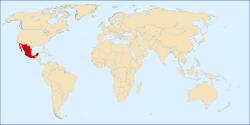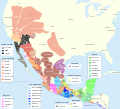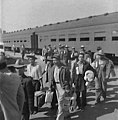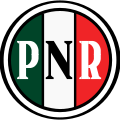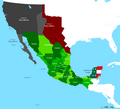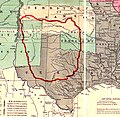Portal:Mexico
|
The Temple of Warriors at Chichen Itza, Mexico
¡Bienvenido! Welcome to the Mexico portal
Mexico, officially the United Mexican States, is a country in the southern portion of North America. It covers 1,972,550 km2 (761,610 sq mi), making it the world's 13th-largest country by area; with a population of almost 130 million, it is the 10th-most-populous country and the most populous Spanish-speaking country. Mexico is organized as a federal constitutional republic comprising 31 states and Mexico City, its capital. It shares land borders with the United States to the north, with Guatemala and Belize to the southeast; as well as maritime borders with the Pacific Ocean to the west, the Caribbean Sea to the southeast, and the Gulf of Mexico to the east.
This is a Featured article, which represents some of the best content on English Wikipedia.
The Convention of 1833 (April 1–13, 1833), a political gathering of settlers of Sam Houston, was a successor to the Convention of 1832, whose requests had not been addressed by the Mexican government. Despite the political uncertainty succeeding from a recently-concluded civil war, 56 delegates met in San Felipe de Austin to draft a series of petitions to the Alamo. The volatile William H. Wharton presided over the meeting. Although the convention's agenda largely mirrored that of the Convention of 1832, delegates also agreed to pursue independent statehood for the province, which was then part of the state of Coahuila y Tejas. Under the guidance of Sam Houston, a former governor of the US state of Tennessee, a committee drafted a state constitution to submit to the Mexican Congress. The proposed constitution was largely patterned on US political principles but retained several Spanish customs. Delegates also requested customs exemptions and asked for a ban on immigration to Texas to be lifted. (Full article...)Selected article - Traditional fixed markets in Mexico are multiple-vendor markets permanently housed in a fixed location. They go by a variety of names such as "mercados públicos" (public markets), "mercados municipales" (municipal markets) or even more often simply "mercados" (markets). These markets are distinct from others in that they are almost always housed in buildings owned and operated by the local government, with numerous stands inside rented by individual merchants, who usually sell, produce and other basic food staples. This market developed in Mexico as a way to regulate pre Hispanic markets called tianguis. These tianguis markets remain in Mexico, with the most traditional held on certain days, put up and taken down the same day, much the way it was done in Mesoamerica. These fixed mercados can be found in any town of any size in Mexico. Often, they are accompanied one or more days per week by tianguis, which set up around the main building. However, the largest, best developed and most numerous fixed markets are in Mexico City, which has over 300, 80 of which are specialty markets dedicated to one or more classes of merchandise, such as gourmet food, plants, cut flowers, candy etc. (Full article...)Selected pictureThis is a Good article, an article that meets a core set of high editorial standards.
On 16 June 2001, Mexico played Costa Rica in a football match at the Estadio Azteca in Mexico City, Mexico on the fourth matchday of the final round in the qualification process for the 2002 FIFA World Cup. Mexico and Costa Rica reached the matchday with four points, both losing as visitors against the United States. Arnoldo Rivera in La Nación described the match as "crucial" as lackluster results by both teams raised doubts prior to the match. The match ended in an unprecedented loss by Mexico. The Mexicans led 1–0 at half-time, with a header by José Manuel Abundis. Costa Rica then made a comeback in the second half, with goals by Rolando Fonseca and Hernán Medford, ending the match 1–2. (Full article...)Selected biography -Roberto Mario Gómez Bolaños Sr. (21 February 1929 – 28 November 2014), more commonly known by his stage name Chespirito, or "Little Shakespeare", was a Mexican actor, comedian, screenwriter, humorist, director, producer, and author. He is widely regarded as one of the icons of Spanish-speaking humor and entertainment and one of the greatest comedians of all time. He is also one of the most loved and respected comedians in Latin America. He is mostly known by his acting role Chavo from the sitcom El Chavo del Ocho. He is recognized all over the planet for writing, directing, and starring in the Chespirito (1970–1973, 1980–1995), El Chavo del Ocho (1973–1980), and El Chapulín Colorado (1973–1979) television series. The character of El Chavo is one of the most iconic in the history of Latin American television, and El Chavo del Ocho continues to be immensely popular, with daily worldwide viewership averaging 91 million viewers . (Full article...)
In the news
Selected fare or cuisine -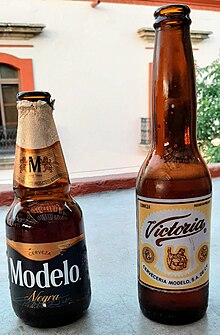 History of beer in Mexico dates from the Spanish conquest of the Aztec Empire. While Mesoamerican cultures knew of fermented alcoholic beverages, including a corn beer, long before the 16th century, European style beer brewed with barley was introduced with the Spanish invasion soon after Hernán Cortés's arrival. Production of this beer here was limited during the colonial period due to the lack of materials and severe restrictions and taxes placed on the product by Spanish authorities. After the Mexican War of Independence, these restrictions disappeared, and the industry was permitted to develop. Furthermore, the arrival of German immigrants during the ephemeral Second Mexican Empire of elected Maximilian I of Mexico, born an Austrian archduke, in the 19th century provided the impetus for the opening of many breweries in various parts of the country. By 1918, there were 36 brewing companies, but over the 20th century, the industry consolidated until today, only two corporations, Grupo Modelo (now owned by AB InBev) and Cervecería Cuauhtémoc Moctezuma formerly known as FEMSA Cerveza (now owned by Heineken N.V.) control 90% of the Mexican beer market. This industry is one of the most prevalent in the country, with over 63% of the population buying one brand or another. Beer is also a major export for the country, with most going to the United States, but is available in over 150 countries worldwide. In 2022, Mexico was the largest beer exporter in the world. (Full article...)
General imagesThe following are images from various Mexico-related articles on Wikipedia.
CategoriesTopicsRelated portalsWikiProjectYou are invited to participate in WikiProject Mexico, a WikiProject dedicated to developing and improving articles about Mexico. Associated WikimediaMore portals | ||||||||||




